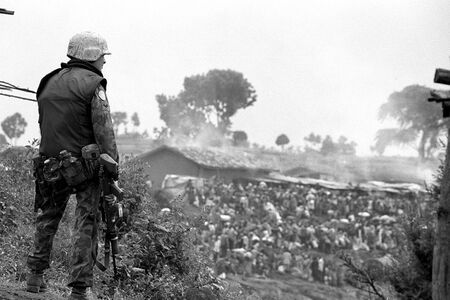Agarput Crisis
| 1987 Agarput crisis | ||||||||
|---|---|---|---|---|---|---|---|---|
 Thalassic Soldier outside Taman, Agarput Republic | ||||||||
| ||||||||
| Belligerents | ||||||||
|
Supported by: |
Supported by: |
Supported by: | ||||||
| Commanders and leaders | ||||||||
|
|
| |||||||
| Units involved | ||||||||
|
Vessels
|
|
| ||||||
| Strength | ||||||||
|
18,327 soldiers (peak) ~1,400 local militia 36 Aircraft 4 ships |
|
| ||||||
| Casualties and losses | ||||||||
|
116 killed 409 wounded |
700+ killed 1,000+ wounded 4,187 arrested |
400+ civilians 500+ wounded 501 arrested | ||||||
|
6,400+ civilians 220,000+ refugees | ||||||||
The 1987 Agarput crisis began after a period of political and economic instability in the Agarput Republic shortly after its incorporation into the Thalassic Federation. Fighting began with attacks by Hindu extremist group Anak-anak Dewi targeting the local government senate offices, killing 102 civilians and administrators, including eight visiting Federation diplomats. Immediately following this the Thalassic Federation Ground Forces deployed the 5th Brigade to assist in reconstruction and peacekeeping efforts. Shortly thereafter local strife erupted into combat between Thalassic forces and local extremist groups, including nationalist brigades Agarput Anyar, as well as Hindu and Islamic extremists. These disparate groups, despite principally being opposed to one another, would also very regularly attack Federation troops.
Background
The Agarput republic has often been defined by its religious divide. The north of the island is predominantly Hindu, while the south holds a significant Muslim population. Tension between these groups date back centuries, and both religious groups trace their lineage to various invasions which have occured throughout the islands history. In the mid 1950s through to mid 1960s the island suffered under a continual Islamist insurgency which only ended with the partial recognition of the southern areas of Pengceluk and Gerokgak and withdrawal of Agarput troops from these areas.
Violence between Muslim and Hindu Agarputs flared up again in the 1980s following an effort by authoritarian president Gebe Ksatria to reclaim the wayward regions. This conflict ended in disaster for the Agarput government, resulting in a Thalassic Federation-brokered ceasefire in 1981. The Ksatria government promptly collapsed later in that same year, with the country briefly falling into civil war, ending with a pro-Federation government in control of the Agarput government. In 1984 the Agarput Republic held a referendum regarding special membership within the Thalassic Federation wherein they would retain local government and autonomy while joining the Federation and benefitting from Federation assistance. The vote was successful with 62% of the population voting to become a member of the Thalassic Federation.
Voting and violence
The Thalassic vote was strife with intimidation and violence, nationalist groups, most of whom were loyal to the now-imprisoned Ksatria, assaulted voting booths and discouraged citizens from attending the vote. Afterwards, these groups also rose up in protest against the Thalassic takeover of the country. Sporadic violence ensued but was promptly stifled by local police, and discontented elements of the public were sated with generous Thalassic infrastructure and reconstruction spending.
Senate Bombing and start of conflict
On the 17th of June at 4:03AM a truck-based fertilizer bomb was detonated outside the local government Senate building, killing over a hundred civilians. Hindu extremist organization Anak-anak Dewi claimed responsibility for the attack under the purview of the armed wing of the movement Temple of Kali. Thalassic and Agarput officials were quickly mobilized to apprehend Temple of Kali members responsible for the attack, arresting 70 people in the following days in suspicion of connection to the attacks. Shortly thereafter the Temple of Kali launched a series of attacks targeting Thalassic and Agarput security forces, as well as civilians, the most high profile of these attacks was a bombing of a Nelson train in 1987 which killed 53 people. While the temple of Kali seized land, they were accused of multiple atrocities, particularly targeting the Muslim population of the island, who they blamed for the collapse of the Agarput order and thus the Thalassic takeover.
Foundation of other paramilitaries
While the Hindu extremist temple of Kali struggled with recruitment, Agarput nationalist organization, Agarput Anyar who had organized protests three years prior, also established their own series of paramilitary groups. As well as Agarput Anyar, Jemaah Islamiyah or Islamic Congregation representing Islamic issues in Pengceluk and Gerokgak, after learning of the atrocities committed by the Temple of Kali targetting Muslims, founded the militant organization, Islamist Self Defence Brigades, with the intention to protect rural and marginal islamic communities from being taken by the Temple. While the ISDB initially remained on neutral terms with Federation forces, Federation attempts to re-incorporate Pengceluk and Gerokgak into the new Thalassic Agarput Republic brought them into direct conflict multiple times.
During the conflict, foreign actors smuggled weapons and equipment to the various paramilitary forces, prompting the Federation Navy to blockade the island to foreign ships, and the Federation Air Force to ground foreign flights to the island. Vessels and flights were redirected to nearby Oelelok for processing, those found not carrying any contraband were then allowed to continue on to the Agarput republic.